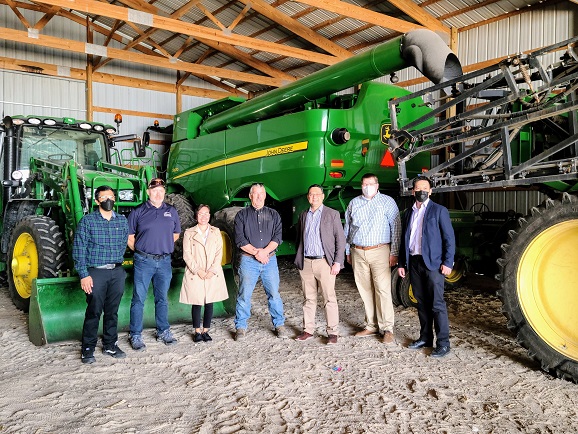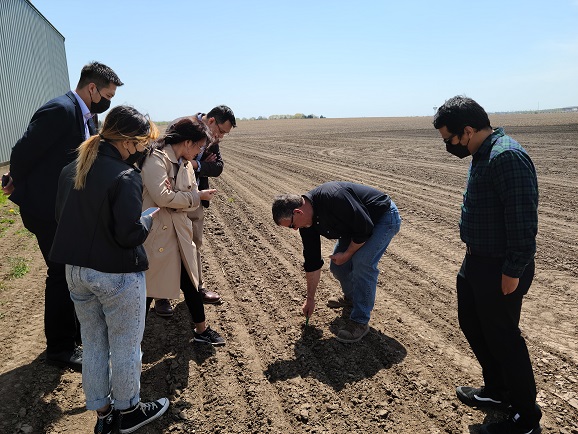By Jill Parrent | ISA Communications Coordinator

In a traditional year, Illinois soybean farmers host over 35 international trade teams on their farms. The visits include an international trade team visiting an Illinois farmer, creating a relationship with the person growing the soybeans they are buying, and seeing and often riding in a tractor or combine in the field, sometimes for the first time. They experience the full agriculture affect, as learning the process doesn’t begin at the time of import.
During these visits, Illinois farmers are asked many questions about their farming practices. These questions could relate to sustainability, economics, or even simple questions about their passion for agriculture. When asking questions, their geographical location in the world also can change what questions are being asked. David Headley, Trade Team Coordinator for the Illinois Soybean Association outlines some of the top questions Illinois farmers and ISA receive from international trade teams during their visits relating to farm operations, sustainability, and production.
Farm Operation

Many visitors have a desire to know who is growing their crops on a level deeper than “an Illinois farmer.” These questions may be more specific to each farmer they are visiting and often relate to the size of their operation, how many tractors they have, who they farm with, why they have a John Deere green or a Case IH red, and anything in-between. These visitors want something to take back and remember while gaining relevant and vital information. Visitors will generally remember the people they meet and information about the farmer while facts can get lost without the personal connection.
The goal of these questions is to get to know the farmer on a personal level and learn who is growing their soybeans. The visitors are from other parts of the world, and they don’t usually realize the drastic difference at first glance of how Illinois farmers grow their soybeans versus their country of origin.
Sustainability
Sustainability is important to these buyers who want to know their soybeans are being grown responsibly with the future in mind. Recently on a trade team visit, a group from Asia asked how they can grow quality soybeans like Illinois farmers. The response was the two major components: sunlight and soil quality. The visitors’ country does not have as much sunlight as Illinois, a vital nutrient for soybeans to grow. Being in North America, we are able to have more sunlight during the summer for longer periods of time, allowing Illinois farmers to produce some of the highest quality soybeans.
Farmers are also asked about the sustainability measures the farmer is using directly on their farm. They are asked about using compaction and no-till farming, how it benefits the farmer for future crops and yields. Ultimately, they want the farmer they are purchasing from to be centered on sustainability, because what farming practices are followed today will impact the soil and soybean growth for future purchasing years.
Production
Production information and data are important to both farmers and buyers. The farmer wants to sell their quality soybeans for the highest price while the buyer wants to spend the least for the best product. Many questions during the visit circle around the five-year average yields, and what factors increase and decrease the yields of the soybean harvest. Often, they have already looked to crop and harvest reports created by the USDA, allowing them to come into the farm visit with a working knowledge of what’s to come.
Other questions center around finances – from the cost to apply fertilizer per acre, to costs of production, to how profitable a farmer is predicting to be this year versus last. They also look to gain knowledge on where a farmer takes their grain after harvest. Does a farmer contract their crops before, during, or after harvest? How much have they sold during harvest? How much does their grain bin hold for later use? Illinois farmers know their business and the crops they grow and can provide detailed information related to the production of an acre of soybeans.
Some questions visitors ask may surprise a farmer because it might be something a farmer has never thought about because it is simply a part of their everyday life. Other inquires may require deeper thinking with specific data and numbers.
Ultimately, during these visits it’s important to connect buyers with farmers so the buyer can know who is growing their soybeans. This assists in gaining a better knowledge moving forward in their decision-making process with the end goal of choosing U.S. soybeans. Plus, the Illinois farmer gains a perspective of the needs, wants, and uses of their U.S. product in another country.
